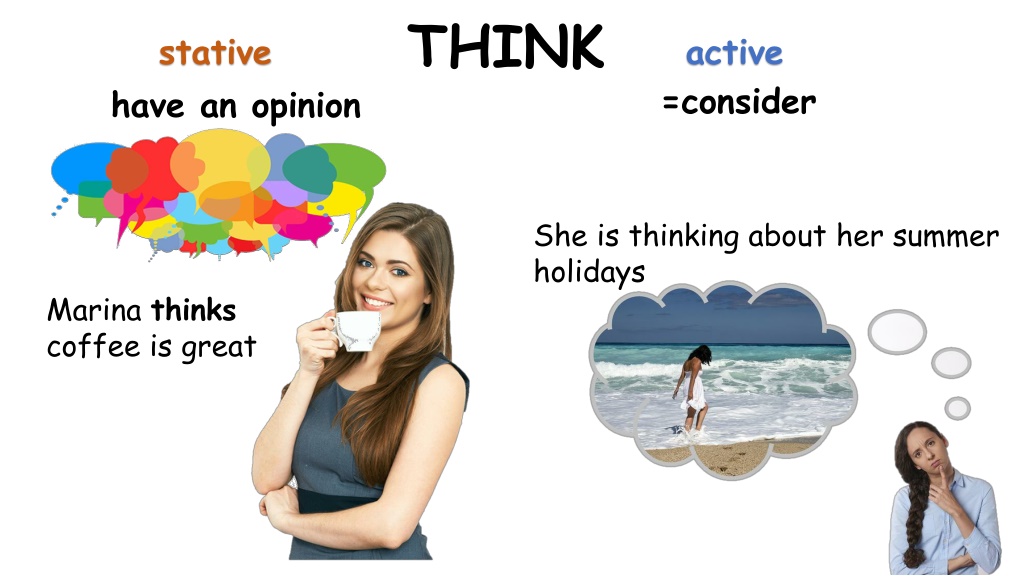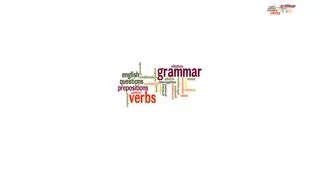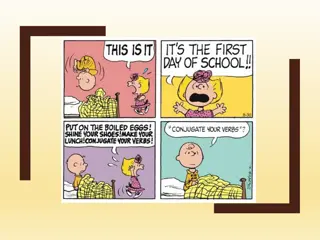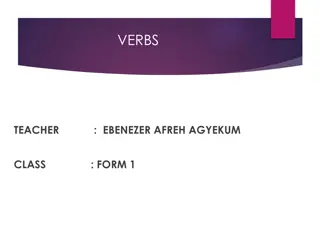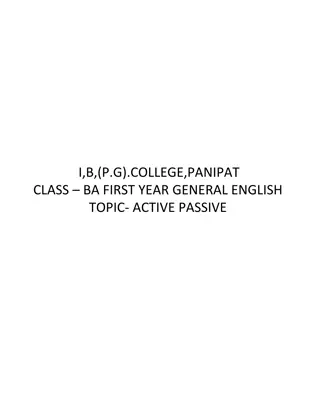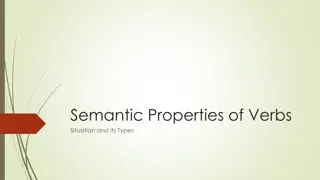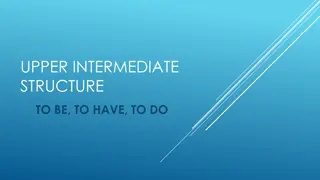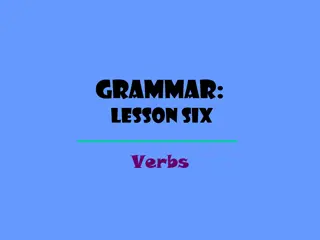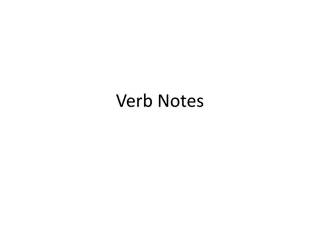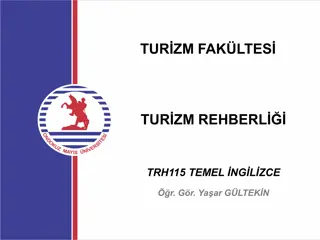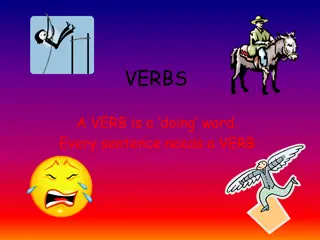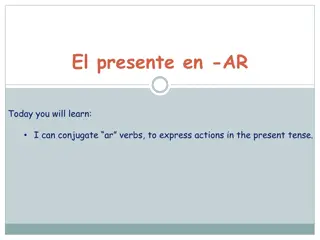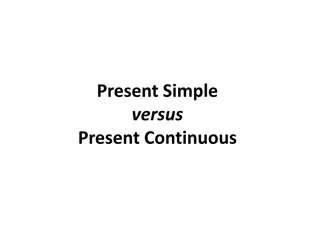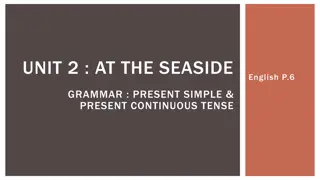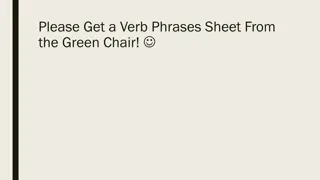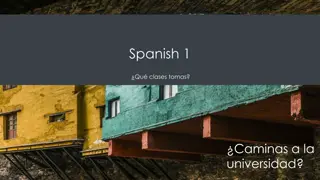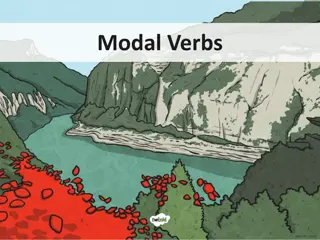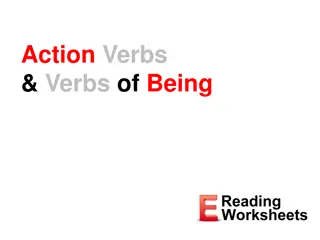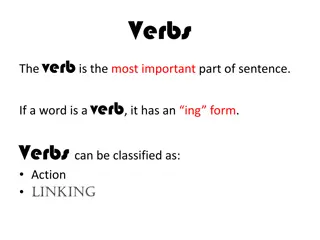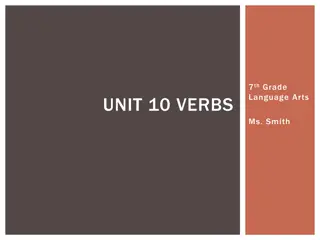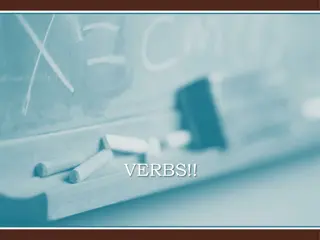Understanding Stative and Active Verbs in Present Simple and Present Continuous
Explore the differences between stative and active verbs in present simple and continuous tenses through examples related to thinking, feeling, having, being, tasting, smelling, looking, weighing, and measuring. Complete sentences using the verbs appropriately. Enhance your grasp of English grammar concepts effortlessly.
Download Presentation

Please find below an Image/Link to download the presentation.
The content on the website is provided AS IS for your information and personal use only. It may not be sold, licensed, or shared on other websites without obtaining consent from the author. Download presentation by click this link. If you encounter any issues during the download, it is possible that the publisher has removed the file from their server.
E N D
Presentation Transcript
THINK stative active =consider have an opinion She is thinking about her summer holidays Marina thinks coffee is great
FEEL stative active experiencing emotions or health issues; when we touch smth when we talk about your opinion; = understand I m feeling tired lately A tailor is feeling fabric I feel you = (I understand you) I feel that it s a great idea!
HAVE stative active when it s part of an expression =own; possession Julie has a car They have a dog Maria is having fun
BE stative active has temporary quality for some period of time He is being immature always has the same characteristic He is immature
TASTE stative active when taste talks about the action of tasting when it describes a flavour He is tasting soup This soup tastes delicious
SMELL stative active when a person uses the nose to smell smth when it describes a quality of smell A cat is smelling flowers Your perfume smells wonderful
LOOK stative active Directing your eyes to smth; Phrasal verbs (look at; for; after) He is looking at a computer screen appearance You look gorgeous This cake looks tasty
WEIGH stative active when we perform an action of weighing Fact of the weight A seller is weighing apples An apple weighs 100 gr
MEASURE stative active when we perform an action of measuring Fact of the measurement The architect is measuring the flat The room measures 5 meters by 7 meters
Complete the sentences with the verbs in Present Simple or Present Continuous 1. I (have/ am having) a great time. 2.I ( see/ am seeing) the manager this afternoon. 3.What (do you think/ are you thinking) about? 4.I (feel/ am feeling) she's making a mistake. 5.Why (do you look/ are you looking) at me like that? 6.She (has/ is having) plenty of money right now. 7.I (think/ am thinking) you're right. 8.He (appears/ is appearing) at the Fortune Theatre next week. 9.I (feel/ am feeling) very tired today. 10.I (see/ seeing) what you're trying to say. 11.It (looks/ is looking) as if it's going to rain. 12.She (appears/ is appearing) to have a problem.
Complete the sentences with the verbs in Present Simple or Present Continuous 1. I (don't believe / I'm not believing) that you cooked this meal yourself. 2.Come on, let's order. The waiter (comes/ is coming). 3.Kate (doesn't want/ isn t wanting) to have dinner now. She isn't hungry. 4.The head chef is ill, so he (doesn't work/ isn't working) today. 5.The bill (seems/ is seeming) very high to me. 6.We've had an argument, so we (don t speak/ aren't speaking) to each other at the moment. 7.My mum (thinks/ is thinking) my diet is awful these days. 8. (Do we need/ Are we needing) to go shopping today? 9.Can I call you back? I (have/ am having) lunch right now. 10.I didn't use to eat oily fish, but now I (love/ am loving) it! 11.What (do you cook/ are you cooking)? It smells delicious!
Complete the sentences with the verbs in Present Simple or Present Continuous 1. We (don't have/ aren't having) a car. 2.He (doesn't have/ isn t having) a car at the moment. 3.(Do you recognize/ Are you recognizing) the man in that photo? It's our old maths teacher. 4.Can you answer the phone? I (talk/ am talking) on my mobile. 5.I'm sorry, I don't understand. What (does this word mean/ is this word meaning) ? 6.You look worried. What (do you think/ are you thinking about)? 7.I'm not sure if we're going skiing this weekend. It (depends/ is depending) on the weather. 8.I (think/ am thinking) that people today eat too much unhealthy food. 9.She (doesn t come/ isn't coming) with us tonight because she's tired.
Choose the correct options to complete the sentences 1. (Do you see/ Are you seeing) the bus number? No, I (don't see/ am not seeing) well. I ( see/ 'm seeing) a doctor tomorrow to get my eyes checked. 2. This dessert (looks/ is looking) mouthwatering! I'm sure it (tastes/ is tasting) delicious! 3. What (do you think/ are you thinking) of this book? Is it a good present for her? I (think/ am thinking) it's perfect! She's keen on reading science fiction. 4. Why are you so excited? I (think/ 'm thinking) about my upcoming trip! 5. Are you eating ice cream? No, I ( taste/ 'm just tasting) it, mum!
Complete the sentences with the verbs in Present Simple or Present Continuous 1. Maria (is/ is being) a student. She (lives and studies/ is living and studying) in Moscow. 2. Now she (wants/ is wanting) to take a language course somewhere in Britain. 3. She (doesn't know/ isn t knowing) what to choose. 4. At the moment, she (chooses/ is choosing) a place and a school. 5. At one of the schools, the course (includes/ is including) not only English lessons but some sport activities. 6. Of course, it (costs/ is costing) more, but Maria (likes/ is liking) sport, so the program (seems/ is seeming) to be really attractive to her. 7. So, now she (needs/ is needing) to save some more money because she (doesn't have/ isn t having) much. 8. She (looks/ is looking) at the advertisement and (thinks/ thinking) how she can do it. 9. She (hopes/ is hoping) she will find the possibility to fulfil her dream.
Choose the Present Simple or Present Continuous form of the verbs to complete the sentences 1. Are you thirsty? (Do you want/ Are you wanting) some water? 2. Don't switch off the laptop! I ( use/ 'm using) it! 3. Don't close the browser! I (need/ am needing) it! 4. What's wrong? Why ( do you look/ are you looking) at me like that? 5. Nothing! It's just that you (look/ are looking) so good in your new dress! 6. The salad (smells/ is smelling) delicious! 7. Thank you! And it (contains/ is containing) only fresh and natural ingredients! 8. I read this book in my childhood but now I (don't remember/ am not remembering) the names of the characters.
Complete the text. Use the Present Simple or Present Continuous Otto (is/ is being) twelve years old. He (currently leans/ is currently learning) English at school. He (loves/ is loving) learning foreign languages a lot and (thinks/ is thinking) that English is a useful language. He (has/ is having) some homework to do. That's why he (sits/ is sitting) here in front of his computer. He (wants/ is wanting) to pass the school English test. Right now he (tries/ is trying) to find an exercise on the superlative form of adjectives. He (thinks/ is thinking) about these rules but, unfortunately, he (doesn't remember/ isn t remembering) them very well. Is it "farest" or "farthest"? He finally finds the rules and exercises on the Internet. It isn't easy, but Otto (has/ is having) fun with the quiz. He (hopes/ is hoping) he (understands/ is understanding) the superlative a little better at the end of the exercise.
